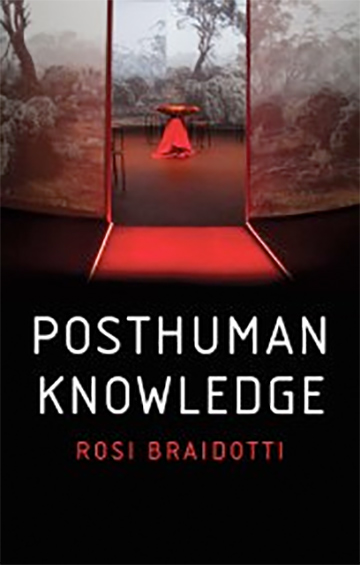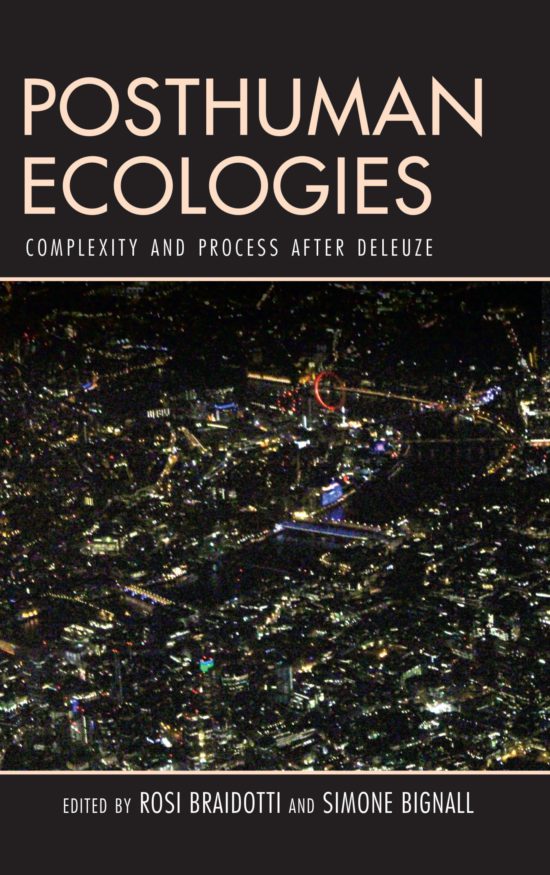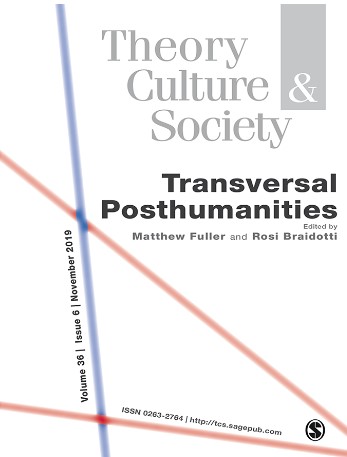2019
“Transversal Posthumanities”
Transversal Posthumanities emerge within the posthuman convergence of posthumanism and postanthropocentrism. Environmental, medical, and digital humanities reposition academic practice towards advanced technologies and climate change issues. A neomaterialist theoretical framework will help distinguish different kinds of Posthumanities: from the profit-oriented knowledge production practices of cognitive capitalism, to community-driven, non-profit experiments with minor knowledges.

2019
Posthuman Knowledge
The question of what defines the human, and of what is human about the humanities, have been shaken up by the radical critiques of humanism and the displacement of anthropomorphism that have gained currency in recent years, propelled in part by rapid advances in our knowledge of living systems and of their genetic and algorithmic codes coupled with the global expansion of a knowledge-intensive capitalism. In Posthuman Knowledge, Rosi Braidotti takes a closer look at the impact of these developments on three major areas: the constitution of our subjectivity, the general production of knowledge and the practice of the academic humanities. She argues that the human was never a neutral category but one always linked to power and privilege; hence we must move beyond the old dualities in which Man defined himself, beyond the sexualized and racialized others that were excluded from humanity. Posthuman knowledge is not so much an alternative form of knowledge as a critical call: a call to build a multi-layered and multidirectional project that displaces anthropocentrism while pursuing the analysis of the discriminatory and violent aspects of human activity and interaction wherever they occur.
2019
“Affirmative Ethics and Generative Life”
Rosi Braidotti's contribution to the Deleuze Studies Conference 2016 held in Rome (University of Roma Tre, 11–13 July), later transcribed and then revised by the author, points firmly to the current need for an affirmative thinking approach, actively standing to the present, while assessing its becoming and imagining new configurations. Saying yes to the world, being worthy of it, does not entail passive acceptance but rather the activation of transformative and critical thinking. To this aim, Braidotti looks at Deleuze as well as at feminist theory. The ontology of immanence turns into a materialist, collective, vital, embodied and relational ethics.
2019
“The Emergent Environmental Humanities: Engineering the Social Imaginary”
If the Environmental Humanities (EH) matter, an essential concern is whether we can speak of the possibility of a philosopher of literary and ecological identity. This paper discusses the intersection points of the Environmental Humanities to the wider scientific debate. It suggests that the EH are suited to help construct knowledge for sustainable futures. The arrival of the Anthropocene provides opportunities to cross disciplinary boundaries. Ecocriticism investigates the complex and contradictory relationship between humans and the environment in literature. Ideas of citizenship allow space for conversation about civic responsibility and stewardship. Animal studies intervenes deeply across the humanities, which acknowledges the interspecies imaginary. Future techno-scientific developments make us reconsider distinctions between humans, animals, and machines. The concept of the posthuman emphasizes how profound changes will be for all species. Serious questions might best be answered by environmental philosophy, which articulates the impact of the environment on humans. New Materialism explains why matter matters, and has clear implications for the study of the environment. Work in postcolonial and digital media provides a platform to challenge geographic borders as well as reconsider national contexts. Essentially, this paper asserts that the EH is building critical mass, and functions as a lightning rod between the arts and sciences. Such a development has profound consequences for the future of literary studies.

2018
Posthuman Ecologies: Complexity and Process after Deleuze
The devolved and dispersed character of human agency and moral responsibility in the contemporary condition appears linked with the deepening global trauma of ‘inhumanism’ as a paradox of the Anthropocene. Reclaiming human agency and accountability appears crucial for collective resistance to the unprecedented state of environmental and social collapse resulting from the inhumanity of contemporary capitalist geopolitics and biotechnologies of control. Understanding the potential for such resistance in the posthuman condition requires urgent new thinking about the nature of human influence in complex interactional systems, and about the nature of such systems when conceived in non-anthropocentric way. Through specific readings and uses of Deleuze’s conceptual apparatus, this volume examines the operation of human-actioned systems as complex and heterogeneous arenas of affection and accountability. This exciting collection extends non-humanist concepts for understanding reality, agency and interaction in dynamic ecologies of reciprocal determination and influence. The outcome is a vital new theorisation of human scope, responsibility and potential in the posthuman condition.
2018
“Braidotti’s Summer School”
Participant of the Summer School 2018 Aster Hoving wrote an article about her experience of the school.
2018
“A Theoretical Framework for the Critical Posthumanities”
What are the parameters that define a posthuman knowing subject, her scientific credibility and ethical accountability? Taking the posthumanities as an emergent field of enquiry based on the convergence of posthumanism and post-anthropocentrism, I argue that posthuman knowledge claims go beyond the critiques of the universalist image of ‘Man’ and of human exceptionalism. The conceptual foundation I envisage for the critical posthumanities is a neo-Spinozist monistic ontology that assumes radical immanence, i.e. the primacy of intelligent and self-organizing matter. This implies that the posthuman knowing subject has to be understood as a relational embodied and embedded, affective and accountable entity and not only as a transcendental consciousness. Two related notions emerge from this claim: firstly, the mind-body continuum – i.e. the embrainment of the body and embodiment of the mind – and secondly, the nature-culture continuum – i.e. ‘naturecultural’ and ‘humanimal’ transversal bonding. The article explores these key conceptual and methodological perspectives and discusses the implications of the critical posthumanities for practices in the contemporary ‘research’ university.

2018
“A Theoretical Framework for the Critical Posthumanities”
What are the parameters that define a posthuman knowing subject, her scientific credibility and ethical accountability? Taking the posthumanities as an emergent field of enquiry based on the convergence of posthumanism and post-anthropocentrism, I argue that posthuman knowledge claims go beyond the critiques of the universalist image of ‘Man’ and of human exceptionalism. The conceptual foundation I envisage for the critical posthumanities is a neo-Spinozist monistic ontology that assumes radical immanence, i.e. the primacy of intelligent and self-organizing matter. This implies that the posthuman knowing subject has to be understood as a relational embodied and embedded, affective and accountable entity and not only as a transcendental consciousness. Two related notions emerge from this claim: firstly, the mind-body continuum – i.e. the embrainment of the body and embodiment of the mind – and secondly, the nature-culture continuum – i.e. ‘naturecultural’ and ‘humanimal’ transversal bonding. The article explores these key conceptual and methodological perspectives and discusses the implications of the critical posthumanities for practices in the contemporary ‘research’ university.